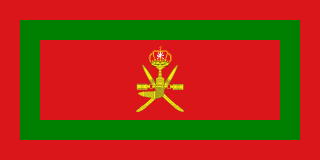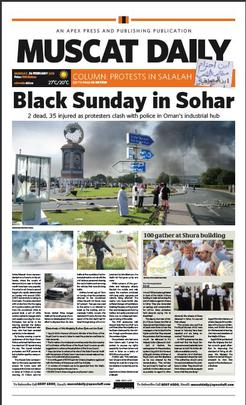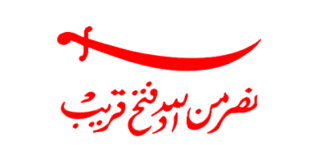 | |
Native name | بريد عمان |
|---|---|
| Founded | 2005 |
Key people | Shaikh Ibrahim bin Sultan Alhosni (Acting CEO) |
| Website | https://www.omanpost.om/ |
Oman Post is the official postal service of Oman. [1]
 | |
Native name | بريد عمان |
|---|---|
| Founded | 2005 |
Key people | Shaikh Ibrahim bin Sultan Alhosni (Acting CEO) |
| Website | https://www.omanpost.om/ |
Oman Post is the official postal service of Oman. [1]
The first post office was opened in Muscat by the British Postal Department in 1856. [1]
Oman Post was established in 2005 by the Royal Decree of His Majesty Sultan Qaboos bin Said. [1]
Oman Post is a member of Universal Postal Union. [1]
Oman Post has 56 branches and 156 partners across the Sultanate. [2]
Asyad Express ship packages to over 220 destinations. Along with its express services, it has domestic delivery across the Sultanate of Oman, with services like Cash on Delivery (COD) and customer fulfillment for e-commerce companies. [1] [3] [2]
Shaikh Ibrahim bin Sultan Alhosni is currently the acting CEO of Oman Post. [3]
Oman Post is an Asyad Group member company. [4]
Oman Post recently launched postage stamps featuring an endangered species, the Arabian Sea Humpback whale. [5]

Oman, officially the Sultanate of Oman, is a country located in West Asia. It is situated on the southeastern coast of the Arabian Peninsula, and spans the mouth of the Persian Gulf. It shares land borders with Saudi Arabia, United Arab Emirates, and Yemen, while sharing maritime borders with Iran and Pakistan. The capital and largest city is Muscat. Oman has a population of 5,492,196 and is ranked the 120th most populous country. The coast is formed by the Arabian Sea on the southeast, and the Gulf of Oman on the northeast. The Madha and Musandam exclaves are surrounded by United Arab Emirates on their land borders, with the Strait of Hormuz and the Gulf of Oman forming Musandam's coastal boundaries.

Muscat is the capital and most populated city in Oman. It is the seat of the Governorate of Muscat. According to the National Centre for Statistics and Information (NCSI), the total population of Muscat Governorate was 1.72 million as of September 2022. The metropolitan area spans approximately 3,500 km2 (1,400 sq mi) and includes six provinces called wilayats, making it the largest city in the Arabian Peninsula by area. Known since the early 1st century AD as an important trading port between the west and the east, Muscat was ruled by various indigenous tribes as well as foreign powers such as the Persians, the Portuguese Empire and the Ottoman Empire at various points in its history. A regional military power in the 18th century, Muscat's influence extended as far as East Africa and Zanzibar. As an important port-town in the Gulf of Oman, Muscat attracted foreign tradesmen and settlers such as the Persians, Balochs and Sindhis. Since the accession of Qaboos bin Said as Sultan of Oman in 1970, Muscat has experienced rapid infrastructural development that has led to the growth of a vibrant economy and a multi-ethnic society. Muscat is termed as a Beta - Global City by the Globalization and World Cities Research Network.

Salalah is the capital and largest city of the southern Omani governorate of Dhofar. As of the census of 2020, it had a population of 331,949.
Oman Air is the legacy airline of the Sultanate of Oman. Based at Muscat International Airport in Seeb, Muscat, it operates domestic and international passenger services, as well as regional air taxi and charter flights.

The system for mail delivery in the United States has developed with the nation. Rates were based on the distance between sender and receiver in the early years of the nation. In the middle of the 19th century, rates stabilized to one price regardless of distance. Rates were relatively unchanged until 1968, when the price was increased every few years by a small amount. Comparing the increases with a price index, the price of a first class stamp has been steady. The logo for the Post Office Department showed a man on a running horse, even as the railroads and then motorized trucks and airplanes moved mail. In 1971, the Post Office became the United States Postal Service, with rates set by the Postal Regulatory Commission, with some oversight by Congress. Air mail became standard in 1975. In the 21st century, prices were segmented to match the sorting machinery in use; non-standard letters required slightly higher postage.

The Sultanate of Muscat and Oman, also known briefly as the State of Muscat and Oman during the rule of Taimur bin Feisal, was a sovereign state that encompassed the present-day Sultanate of Oman and parts of present-day United Arab Emirates and Pakistan, in the second half of the 19th century and 20th century. Ruled by the Busaid dynasty, it was established as a result of the partition of the Omani Empire upon the death of its last ruler Said bin Sultan. The Sultanate transitioned into a new form of government after the palace coup of 23 July 1970 in which the sultan Said bin Taimur was immediately deposed in favor of his son Qaboos bin Said.

The Imamate of Oman was a historical state within the Oman proper in the Hajar Mountains, part of the present-day Sultanate of Oman. The capital of the Imamate alternated historically between Rustaq and Nizwa. The Imamate's territory extended north to Ibri and south to Alsharqiyah region and the Sharqiya Sands. The Imamate was bounded from the east by the Hajar Mountains and from the west by the Rub' al Khali desert. The Al Hajar Mountains separated the Imamate of Oman from Muscat and Oman. The elected Imam (ruler) resided in the capital, and Walis (governors) represented the Imamate in its different regions.

U.S. Special Delivery was a postal service paid for with additional postage for urgent letters and postal packets which are delivered in less time than by standard or first class mail service. Its meaning is different and separate from express mail delivery service. Essentially it meant that a postal packet was delivered from a post office to the addressee immediately once it arrived at the post office responsible for delivering it, rather than waiting for the next regular delivery to the addressee.

The Bangladesh Post Office also known by trade name Bangla Post is a government-operated agency responsible for providing postal services in Bangladesh. It is a subsidiary of the Ministry of Posts, Telecommunications and Information Technology. This ministry is concerned with the policymaking for its two attached departments. The Director General of Bangladesh Post Office is Md Harunur Rashid.

The House of Busaid, also known as Al Said dynasty, is the current ruling royal house of the Oman, and former ruling royal house of the Omani Empire (1744–1856), Sultanate of Muscat and Oman (1856–1970) and the Sultanate of Zanzibar (1856–1964). It was founded by Ahmad bin Said al-Busaidi, ruler of Oman and its east African territories at the time.

India–Oman relations are foreign relations between the Republic of India and the Sultanate of Oman. India has an embassy in Muscat, Oman. During British rule in India, Bombay presidency controlled Oman for the British Empire. An Indian consulate was opened in Muscat in February 1955 which was upgraded to a consulate general in 1960 and later into a full-fledged embassy in 1971. The first ambassador of India arrived in Muscat in 1973. Oman established its embassy in New Delhi in 1972 and a consulate general in Mumbai in 1976. India and Oman have had trade and people-to-people ties for several millennia. Oman is home to a large Indian expatriate community and for Oman, India is an important trading partner. Politically, Oman has been supportive of India's bid for permanent membership of the United Nations Security Council.

Muscat Daily is an Omani newspaper that was founded in 2009. The print edition of Muscat Daily is the largest-selling English daily in Oman, with nearly 33,500 copies sold every day on Omani weekdays. Apex Media includes its free weekly newspaper 'theweek' free to Muscat Daily subscribers each Thursday as their weekend edition. Muscat Daily is owned by Apex Media, an Omani publishing company established for nearly 40 years. Other publications in the Apex Media stable include the annual, Business Directory and Tribute. Apex also does occasional projects such as the Map of Oman, Apex Map of Muscat, The Sultan Qaboos Grand Mosque coffee table book, etc. Apex Media was founded in 1980 by Omani businessman Saleh Zakwani, who is also the current Executive Chairman of the company.
This is a survey of the postage stamps and postal history of Muscat and Oman, including the present day Sultanate of Oman.

The Royal Oman Police (ROP), also known as Oman Police, is the main law and order agency for the Sultanate of Oman. It maintains a helicopter fleet and also carries on the duties of safeguarding the long Omani coastline.
Internal Security Service is the national security agency of the Sultanate of Oman. The agency focuses solely upon domestic security while foreign intelligence operations is specifically handled by the Palace Office, which controls external security and coordinates all intelligence and security policies.

The Jebel Akhdar War or the Oman War, also known as Jebel Akhdar rebellion, broke out in 1954 and again in 1957 in Oman, as an effort by the local Omanis in the interior of Oman led by their elected Imam, Ghalib al-Hinai, to protect the Imamate of Oman from the occupation plans of sultan Said bin Taimur, backed by the British government, who were eager to gain access to the oil wells in the interior lands of Oman. Sultan Said received direct financing to raise an armed force to occupy the Imamate of Oman from Iraq Petroleum Company (IPC), a consortium of oil companies that was majorly owned by what is known today as Royal Dutch Shell, Total, ExxonMobil and British Petroleum (BP); the latter was majority-owned by the British government.

The Foreign Ministry is the government body in the Sultanate of Oman responsible for organising and directing Oman's relations with other countries and with regional and international organisations.

British postal agencies in Eastern Arabia issued early postage stamps used in each of Abu Dhabi, Bahrain, Dubai, Kuwait, Muscat and Qatar. Muscat and Dubai relied on Indian postal administration until 1 April 1948 when, following the Partition of India, British agencies were established there. Two agencies were opened in Qatar: at Doha and Umm Said. In Abu Dhabi, an agency was opened on Das Island in December 1960 and in Abu Dhabi City on 30 March 1963. The agencies also supplied stamps to Bahrain until 1960; and to Kuwait during shortages in 1951–53.

The Omani Empire was a maritime empire, vying with Portugal and Britain for trade and influence in the Persian Gulf and Indian Ocean. After rising as a regional player in the 18th century, the empire at its peak in the 19th century saw its influence or control extend across the Strait of Hormuz to modern-day Iran and Pakistan, and as far south as Cape Delgado. After the death of Said bin Sultan in 1856 the empire was divided between his sons into two sultanates, an African section ruled by Majid bin Said and an Asian section ruled by Thuwaini bin Said.
Revenue stamps of Oman were first issued in the 1930s and continue to do so to the present day. The first revenue stamps of c. 1930 consists of at least five stamps which depict palm trees and is inscribed State of Muscat and Oman in Arabic. Most examples of this issue are found in a private document archive, and very few are known in the hands of collectors.